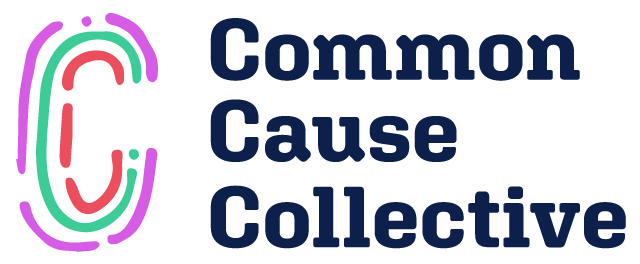Code Of Conduct
This policy is designed to clearly communicate our standards of behavior for our community and the process for reporting violations of these standards. We are committed to having an inclusive community embracing different perspectives and viewpoints. And we are equally dedicated to providing a safe and productive experience for everyone who participates in Common Cause Collective and to treating everyone with respect. That means that misconduct, including but not limited to harassment in any form, will not be tolerated. Community Members* violating these standards jeopardize losing the privilege of participation in our community at the discretion of the Common Cause Collective Organizers. Our policy is as follows:
Misconduct Includes, But Is Not Limited To, The Following Behaviors At ANY Common Cause Collective Meetings, Events, or Activities:
Sexual harassment, which includes unwelcome sexual advances, requests for sexual favors and other verbal or physical conduct of a sexual nature. Other examples that might constitute sexual harassment are publicly indecent behavior**; repeated and unwelcome sexual jokes, innuendo, advances, or propositions; repeated verbal abuse of a sexual nature; repeated and unwelcome graphic commentary about an individual's body, sexual prowess or sexual deficiencies; repeated leering or insulting or obscene comments or gestures; and other physical, verbal or visual conduct of a sexual nature. Sexual harassment need not be sexual. A pattern of profanity or rudeness based on your gender, for example, might also constitute sexual harassment.
Harassing, physically threatening, or physically or verbally abusing any person because of, but not limited to, that person’s race, ethnicity, age, gender, religion, marital status, disability, sexual orientation, or viewpoint.
Conducting oneself in a manner endangering the health or safety of another person.
Exhibiting disorderly conduct, including but not limited to, abuse of controlled substances or overt drunkenness.
Bringing any weaponry, firearms, dangerous chemicals, or any materials specifically banned by the venue space to a Common Cause Collective meeting, activity, or event.
Defacing property at a Common Cause Collective meeting, activity, or event.
Any social media posting reflecting any of the above behavior occurring at a Common Cause Collective meeting, event, or activity.
Other Misconduct
Making intentionally false communications, either written, spoken, or posted on any social media, that harms a community member or the organization reputation.
Stealing or misappropriating any property (including digital) belonging to another community member or the collective. This includes all materials developed for or on behalf of Common Cause Collective without the express permission of the member and/or a Common Cause Collective organizer.
Reporting Misconduct
The safety, well-being and professional reputations of our community members is of the utmost importance. If someone engages in behavior that violates this Code of Conduct, you are urged to address the situation.
If you feel comfortable doing so, you are encouraged to first speak to the person directly, asking them to cease the misconduct. If you are not comfortable confronting the person directly, or if the misconduct continues, you are urged to report the behavior to an organizer directly or by emailing hello@commoncause.design. If the offending person is a Common Cause Collective organizer, please report the matter to another organizer as we hold our organizers to the same standard as the rest of the community.
While confidentiality will be respected to the extent possible, allegations of illegal behavior must be investigated and must be based on a written complaint. If you are uncomfortable putting your complaint in writing, the person to whom you brought the allegations will create a written complaint and ask you to review and correct it and to then sign the final version.
You should be assured that there will be no retaliation against you for making good faith claims.
How Complaints Are Investigated
The organizers will appoint a person to assume the role of Lead Investigator. While in most cases this responsibility will be assigned to an active organizer, other persons not on the organizing team may be asked to serve in this capacity. Lead Investigators or their designees will interview accusers, asking for the identification of relevant witnesses and production of relevant documents.
Persons accused will also be interviewed. They will be provided with a copy of the written complaint against them, asked to respond, and asked to identify any relevant witnesses and produce relevant documents. They also will be warned about the need to protect the accuser from retaliation.
Persons with relevant information will also be interviewed. During the interview, they will be told of the need for confidentiality and the need to protect accusers from retaliation.
Relevant documents will be reviewed.
How violations and sanctions are determined
The Lead Investigator will prepare a report for the organizers summarizing their findings and the basis for those findings. If any charges were upheld, the organizers will determine an appropriate sanction.
How sanctions are imposed
Sanctions will be imposed and enforced by the Common Cause Collective organizers. If the sanction includes revocation of the accused’s participation in the community, said person will be banned from Common Cause Collective meetings, events, and activities for a set period of time and only readmitted if the organizers and the accuser are convinced they’ve changed their behavior.
…
* Community Members include anyone who’s ever participated in a Common Cause Collective meeting, event, or activity.
** Publicly indecent behavior is defined as:
Obscene or indecent acts, characterized by, or for the purpose of becoming aroused.
Sexual behaviors that are unlawful in nature and are performed with the intention of arousing the perpetrator or the person to whom the behavior is directed.

